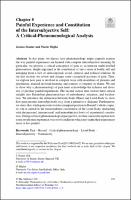Chapter 8 Painful Experience and Constitution of the Intersubjective Self
A Critical-Phenomenological Analysis
Author(s)
Stanier, Jessica
Miglio, Nicole
Collection
WellcomeLanguage
EnglishAbstract
In this paper, we discuss how phenomenology might cogently express
the way painful experiences are layered with complex intersubjective meaning. In
particular, we propose a critical conception of pain as an intricate multi-levelled
phenomenon, deeply ingrained in the constitution of one’s sense of bodily self and
emerging from a web of intercorporeal, social, cultural, and political relations. In
the first section, we review and critique some conceptual accounts of pain. Then,
we explore how pain is involved in complex ways with modalities of pleasure and
displeasure, enacted personal meaning, and contexts of empathy or shame. We aim
to show why a phenomenology of pain must acknowledge the richness and diversity
of peculiar painful experiences. The second section then weaves these critical
insights into Husserlian phenomenology of embodiment, sensation, and localisation.
We introduce the distinction between Body-Object and Lived-Body to show
how pain presents intersubjectively (e.g. from a patient to a clinician). Furthermore,
we stress that,while pain seems to take amarginal position inHusserl’s whole corpus,
its role is central in the transcendental constitution of the Lived-Body, interacting
with the personal, interpersonal, and intersubjective levels of experiential constitution.
Taking a critical-phenomenological perspective,wethen concretely explore how
some peoplemay experience structural conditions whichmay make their experiences
more or less painful.


 Download
Download